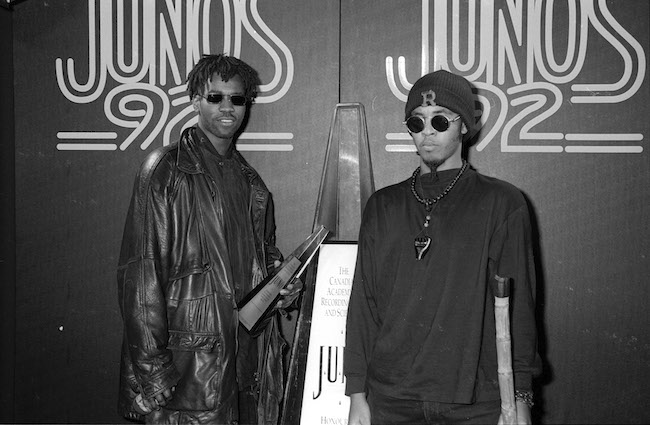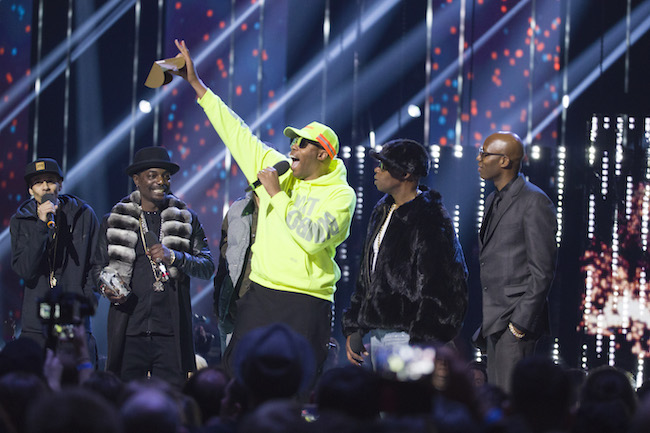Today, Canadian rap music enjoys an unprecedented level of acclaim locally and globally. Look no further than the world-beating popularity of Toronto’s reigning king of rap, Drake, or the recent successes of JUNO-nominated duo 88Glam and JUNO-winner Tory Lanez.
“Complex” might be the most apropos word to describe rap music’s history at the JUNO Awards. Given that rap music at its core is rebel music, trying to get a countercultural art form to perfectly fit in and engage corporatized award show processes might feel like trying to fit a square peg in a round hole.
Likewise, given the chronic and systemic anti-Black racism within the Canadian music industry, which throughout the last 30 years has meant gross major label inattention to rap music and its largely Black music practitioners; a scarcity of Black music A&R’s and executives, coupled with a lack of Black/urban commercial radio station and/or programming options; the only way to go has always been up on this long winding road to full equality at the JUNOS.
From the earliest known English Canadian hip-hop singles being released roughly a decade before a rap category was first introduced in 1991; from Mr. Q’s (Jay McGee) 1979 single “DJ Style (Don’t Stop Til’ You Get Enough)” to the Singing Fools’ 1982 single “The Bum Rap”, the first winner of the Rap Recording of the Year was an obvious choice: the smash single, “Let Your Backbone Slide” from the breakthrough album Symphony In Effect by Maestro Fresh-Wes (Wesley Williams, and now known simply as Maestro), who would later be referred to by many as the Godfather of Canadian hip hop.

Dream Warriors won the 1992 JUNO Award for Rap Recording of the Year. Credit: Barry Roden.
Curiously, for many years in a singular Rap Recording of the Year category, full-length albums competed against singles, EP’s and the occasional song from a mixtape or compilation album. In fact, throughout the ‘90s winners and nominees included some timeless singles – notably “Certified,” by Rexdale’s Ghetto Concept, which won in 1995, and the same duo’s “EZ On the Motion,” which won in 1996. These tracks not only competed against a flurry of other singles, but also against full albums by the likes of rap groups Dream Warriors or The Rascalz. The GRAMMYs on the other hand have always had various rap categories to separate singles from albums, and also included different performance-based rap categories.
When The Rascalz actually won the Rap Recording of the Year award in 1998, it was immediately followed by the group declining the award as a protest move citing racism as being the reason that the rap category was presented the night before the main ceremony. The following year, 1999, was the first time rap’s winners would receive their JUNO Award during The JUNO Awards Broadcast.
By the turn of the new millennium, while Toronto was still the centre of the Canadian hip-hop scene, an opening up of the national rap landscape was happening. The following year the classic rap single “Northern Touch” by Vancouver’s The Rascalz (featuring Choclair, Kardinal Offishall, Thrust and Checkmate) won the award. And the tide continued to turn. Certainly by 2001, over a six-year period, when Vancouver’s Swollen Members won the Rap Recording of the Year four times (2001, 2002, 2003, 2007) – perhaps fuelled by the success of their fellow city dwellers, The Rascalz – signified that rap music from regions beyond the hip-hop hotbed of the ‘Six was getting more traction.
By the time the Canadian hip-hop scene moves into the 2010s, the Canadian music industry in general, including the JUNOS rap category, gets bookmarked and highlighted by the Drake Effect. Toronto rapper Kardinal Offishall’s chart success in the US – his 2008 hit single “Dangerous” with Akon charted at No. 5 on the Billboard Hot 100 chart – coupled with a 2009 JUNO win for his incredible album Not 4 Sale becomes the catalyst for the future of Canadian rap music. Kardinal’s cross-border recognition and chart penetration effectively turned American heads, and gave birth to the notion that perhaps a rap megastar could hail from north of the border. Enter Drake, whose 2010 single, “Best I Ever Had” charted at No. 2 on the Billboard Hot 100.
Certainly, the relative absence of live televised JUNO rap performances since its inception, 2010 onwards, viewers have since been treated to a flurry of interesting and eclectic live performances, beginning with Nova Scotia rapper Classified who memorably opened up the 2010 show on St. John’s streets with “Oh… Canada,” all the way to pairings of rock, R&B and pop artists with noteworthy rappers; Simple Plan with K’naan (2012), Serena Ryder and Classified (2014), The Weeknd and Belly (2016).

The Northern Touch All-Stars appear at the 2018 JUNO Awards. Credit: CARAS/iPhoto
In recent years, show organizers have made an effort to honour Canadian rap’s legacy, as in 2018, when the Northern Touch All-Stars – comprising past winners The Rascalz, Kardinal Offishall, Choclair, Thrust and Checkmate – presented the Rap award won by Tory Lanez (who was not in attendance) and performed an acapella version of “Northern Touch,” arguably one of the most important songs in Canada’s rocky rap history.
At last year’s virtual JUNOS, co-host and CBC radio host Odario Williams, a rapper himself, poignantly referenced “the long and difficult road for Black and Indigenous artists” in Canada. Incremental progress may seem too slow for some, but the JUNOS are attempting to learn from the past, and are committed to playing their part in levelling the playing field for rap music, the most streamed genre of music, and helping to celebrate its brighter future.
Featured: Maestro Fresh-Wes appears in the press room at the 1991 JUNO Awards after winning Rap Recording of the Year. Credit: Barry Roden.